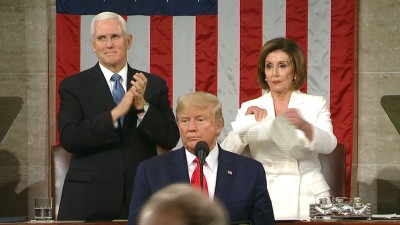 Every four years when it is time for the Iowa caucuses, and people start gathering at caucusing sites, I am reminded of Shirley Jackson’s story, ‘The Lottery.”
Every four years when it is time for the Iowa caucuses, and people start gathering at caucusing sites, I am reminded of Shirley Jackson’s story, ‘The Lottery.”
― Anne Lamott
Nothing jolts the creative writer like failure, a necessary and constant companion to every working writer, so maybe the complete breakdown of our collective ability to tell the story of our national life in this perilous time in U.S. history will jolt writers to do more, to do better, to be more and be better.
Here at the Wellstone Center in the Redwoods, we’d like to encourage writers to do more – to use fiction as a communications tool to help clear the static of the daily outrage and horror, to help us collectively focus on a deeper perspective, to remember who we are as a people. We will sponsor a contest for writers of fiction making some sort of contribution to the challenge of living through the time of Trump – details to follow – but first, we’d love suggestions and advice on how fiction writers can do more. Share your ideas, please, in the comment section below (warning: connected to Facebook) or by emailing us directly at info@wellstoneredwoods.org.
Here’s where it stands: We’re in a battle for the soul of the nation, its future as an actual democracy, and right now we’re losing. At its core this is a literary battle – a fight between fiction writers with a flair for the lurid and attention-grabbing versus nonfiction writers with an overly punctilious sense of what’s knowable and what counts as truth.
Great fiction is always truer than any nonfiction, because it reaches for a deeper truth. We know it’s true because we feel it’s true.
Never before have we had someone in the White House who sees the role of President as that of fiction writer, telling whatever tales come to him, lying daily, but somehow, implausibly, convincing large sections of the public – and opinion makers – to pretend that his fictions are persuasive because he pretends to believe them.
The rise of Trumpism is the triumph of the ultimate unreliable narrator. This particular novel is over-the-top dystopian, crying kids in cages leading, we can only assume, to internment camps in a second Trump administration, if our story tellers do not rally and communicate with more power and clarity. Yes, it is on us – if we care, that is.
For the most part, sad to say, our powerful voices – like those in opposition to George W. Bush’s push to war in Iraq — “stand passively mute,” as the late West Virginia Senator Robert Byrd said in a February 2003 floor speech, “seemingly stunned by the sheer turmoil of events.”
Jon Stewart stepped down from his chair as best friend to millions of us who barely made it through the Bush years, handing over “The Daily Show” because the burden was too great, and yet once again it is the late night comedians – and Andy Borowitz and The Onion – that do the most salient truth-telling. (Borowitz’s latest: Florida Offers to Help Iowa Count Votes.)
The Trump era has inspired great journalism, a lot of it, but also a startling amount of either lazy or implicitly cheerleading coverage. The ultimate bias of most reporters is not pro-Republican, or pro-Democrat, or ideological in any particular way, its pro-story: A sportswriter wants action, a dramatic home run or collision at the plate, and the political reporter wants the same, something people will be talking about. So if Trump’s Reality TV version of a president, an “act” through and through, as Trump himself has admitted in confidence, hits the right notes of drama, certain morally void professional typists will laud him elegant the Leader like Riefenstahl with her Nuremberg film.
Take this instantly infamous example from CNN.com: Trump Makes Dazzling, Divisive Reelection Pitch in State of the Union. You can almost hear the shish-boom-bam of pom-pons being pumped in the air. Then in the fifteenth – 15th! – paragraph, the writer gets around to pointing out that Trump was lying through his teeth: “But as is often the case with Trump, the reality that he sketched was often at odds with the facts. His 80-minute appearance was pockmarked with exaggerations, falsehoods and misleading rhetoric.” So there you have it: The writer knows it’s all a sham, but why not suck down some helium and play along? Fascism can be fun!
Trump is a confidence man. A con artist. He pretends he’s full of “confidence” or full of “conviction” and reporters for some reason pretend this obvious performance is real. Why? Because it’s easy to pretend, easy to make deadline that way, and hard to stand up for actual truth.
I once had the honor of working side by side with the great Murray Kempton, one cubicle over at New York Newsday, and even as a rail-thin Pulitzer Prize winner in his late 60s, Murray still rode his bicycle all over Manhattan because he believed a reporter had a moral obligation to tell a deeper truth.
On the impeachment of Donald Trump, Murray would have been a roman candle fusillade of piercing clarity and simmering outrage, the elegantly constructed rococo prose not just challenging and entertaining, but also conveying some deeper moral truth, some acknowledgment that playing along with Trump-as-spectacle rots at something precious.
There are great newspaper columnists out there – Jennifer Rubin and Dana Milbank of the Washington Post and Michelle Goldberg of The New York Times all write with the urgency of the moment, the opposite of paint by numbers, the opposite of going along with the flow out of inertia. Rubin tweeted during Trump’s State of the Union Tuesday night: “The media has an obligation to indicate IN HEADLINES what a mess of utter lies and disinformation this is.” She was right. Headline writers did not heed her advice.
So what of our authors? Our great novelists? Many lend their voices via social media with sharp wit and clear perspective, like @viet_t_nguyen and @MattGallagher0 and of course the incomparable @ANNELAMOTT. All three tweet about daily happenings and also about their works in progress, each of which I’m eager to read. I think we need more like them, but no one can do it all – dig deep to live within a novel, attend to life away from the keyboard and also be sparkly and witty and sharp in little social-media bursts.
What I don’t see are the sort of grand gestures that can help opinion makers question their assumptions. As an example from Germany, where I lived or a decade staring in 1999, a planned light show in Berlin’s Tiergarten to mark the arrival of 2000, was dramatically altered, absurdly but interestingly, because some – like Nobel Prize winning author Gunter Grass – felt the simulation of the show reminded them of Hitler’s rallies. Grass and other notables signed a joint letter given prominent play in the German press and the show was canceled.
Or what of using writing to respond to this existential emergency? We might be years into a second Trump term, publishing in some under-the-radar virtual samizdat, to avoid a knock on the door, by the time the slow-paced mechanisms of 21st Century fiction stir themselves to respond to the Trump challenge to our reality, to our good faith, to our trust in decency and the founding documents.
Adam Schiff and the other House Impeachment Managers told a powerful and compelling story in the impeachment trial of Donald Trump – and it is a story that needs to be told again and again. Yes, it is a story grounded in fact, in reality, nailed down across the board, with achingly credible voices like Yovanovitch and Vindman adding to our depth of understanding, but it was only a beginning. How we build on that story, how we convey it to people, will determine what sort of world we will wake up to in 2021.
Newspapers file running, which amounts to a first draft, and then when possible check back in with a writethru, deeper and better reported, more thoughtful, more nuanced. In this case, in the story of impeachment, books will need to provide the writethru – and they’d better do it fast.
– Steve Kettmann
Note: This blog was on semi-hiatus, but will now resume on a weekly basis.
Other recent blogs from Steve:
Want to receive Steve’s blog on writers and writing every week by email? Sign up below.

